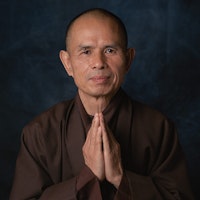To develop understanding, you have to practice looking at all living beings with the eyes of compassion.
To develop understanding, you have to practice looking at all living beings with the eyes of compassion.
Thich Nhat Hanh

With the Eyes of Compassion
Theme: Compassion
The root-word “budh” means to wake up, to know, to understand. A person who wakes up and understands is called a Buddha. It is as simple as that. The capacity to wake up, to understand, and to love is called Buddha nature…
When you understand, you cannot help but love… To develop understanding, you have to practice looking at all living beings with the eyes of compassion. When you understand, you love. And when you love, you naturally act in a way that can relieve the suffering of people.
Early Life and Education: Thich Nhat Hanh was born on October 11, 1926, in Thừa Thiên-Huế Province, Vietnam. At the age of 16, he entered the monastery at nearby Từ Hiếu Temple, where he was ordained as a monk. He then went on to study both Vietnamese traditions of Buddhism and Western philosophy at the Báo Quốc Buddhist Academy and the University of Saigon. His synthesis of Eastern and Western thought led him to develop a unique approach to mindfulness and Zen practice, which he shared with people from different walks of life.
Activism and Teachings: During the Vietnam War, Thich Nhat Hanh was a strong advocate for peace and reconciliation. He founded the School of Youth for Social Service, training young activists in Buddhist principles and nonviolent resistance. His efforts to end the violence and his calls for peace drew international attention. Martin Luther King Jr. nominated him for the Nobel Peace Prize in 1967. Thich Nhat Hanh authored numerous books, teaching mindfulness and compassion, and founded the Plum Village Tradition, a network of monasteries and practice centers around the world.
Later Life and Legacy: In his later years, Thich Nhat Hanh continued to travel, write, and teach, spreading the message of mindfulness and love. He suffered a severe stroke in 2014 that limited his ability to communicate but remained an inspiring figure. After spending some years in France at Plum Village, he returned to Vietnam in 2018 to spend his remaining years at his root temple, Từ Hiếu. Thich Nhat Hanh passed away on January 22, 2022, leaving behind a legacy of profound teachings that continue to inspire individuals and communities across the globe to live with understanding, compassion, and interconnectedness. His life's work serves as a beacon for those seeking a path of peace and love in the world.
Being Peace
Hạnh Thich Nhất. Being Peace. Edited by Rachel Neumann, Parallax Press, 1987 [Thich Nhất Hạnh, Being Peace] pp. 18, 21-24.

Thich Nhat Hanh
Theme: Compassion

About This Thich Nhat Hanh Quote [Commentary]
Thich Nhat Hanh teaches that true understanding comes from seeing with the eyes of compassion. “To develop understanding, you have to practice looking at all living beings with the eyes of compassion.” He explains that the root of the word “Buddha” means “to wake up,” and that awakening includes both understanding and love. When one truly sees another without judgment, recognizing their suffering and shared humanity, compassion arises naturally. This way of seeing is not passive but an active practice that nurtures wisdom and care.
“When you understand, you love,” he continues, showing that real understanding transforms how we relate to others. Meditation and mindfulness help cultivate this clarity, allowing people to remain steady even in difficult times. He teaches that this practice of looking deeply can dissolve fear and resentment, opening the way for connection. Rather than being trapped by personal suffering, one becomes present to the suffering of others, responding with kindness instead of reaction.
With understanding and love comes action. “When you love, you naturally act in a way that can relieve the suffering of people.” Compassion is not just a feeling but a way of being that moves people to care for one another. Thich Nhat Hanh reminds us that in times of hardship, even one person’s calm presence can bring clarity and peace. By embodying understanding in daily life, individuals can help create a world where suffering is met with love, and love leads to meaningful change.
Richard Rohr, Look with the Eyes of Compassion
The Buddhist monk Thich Nhat Hanh (born 1926) is one of the world’s most influential spiritual teachers. During the Vietnam War, his work for peace brought him into friendship with Dr. Martin Luther King, Jr., Thomas Merton, and other Christians who shared his belief that peace must be who we are, not just something we demand. Thich Nhat Hanh teaches:
“This capacity of waking up, of being aware of what is going on in your feelings, in your body, in your perceptions, in the world, is called Buddha-nature, the capacity of understanding and loving… It is with our capacity of smiling, breathing, and being peace that we can make peace.
Many of us worry about the world situation. We don’t know when the bombs will explode. We feel that we are on the edge of time. As individuals, we feel helpless, despairing. The situation is so dangerous, injustice is so widespread, the danger is so close. In this kind of situation, if we panic, things will only become worse. We need to remain calm, to see clearly. Meditation is to be aware, and to try to help.
I like to use the example of a small boat crossing the Gulf of Siam. In Vietnam, there are many people, called boat people, who leave the country in small boats. Often the boats are caught in rough seas or storms, the people may panic, and boats can sink. But if even one person aboard can remain calm, lucid, knowing what to do and what not to do, he or she can help the boat survive. His or her expression—face, voice—communicates clarity and calmness, and people have trust in that person. They will listen to what he or she says. One such person can save the lives of many.
Our world is something like a small boat. Compared with the cosmos, our planet is a very small boat. We are about to panic because our situation is no better than the situation of the small boat in the sea. . . . Humankind has become a very dangerous species. We need people who can sit still and be able to smile, who can walk peacefully. We need people like that in order to save us. Mahayana Buddhism says that you are that person. . . .
The root-word ‘budh’ means to wake up, to know, to understand. A person who wakes up and understands is called a Buddha. It is as simple as that. The capacity to wake up, to understand, and to love is called Buddha-nature. [Christians would call this Christ nature, the Christ self, or the mind of Christ.]…
When you understand, you cannot help but love… To develop understanding, you have to practice looking at all living beings with the eyes of compassion. When you understand, you love. And when you love, you naturally act in a way that can relieve the suffering of people.”
—Richard Rohr [Daily Meditation From the Center for Action and Contemplation, Week 30, Being Peaceful Change (Wednesday, July 29, 2020)].
Resources
Related Quotes
Copyright © 2017 – 2026 LuminaryQuotes.com About Us